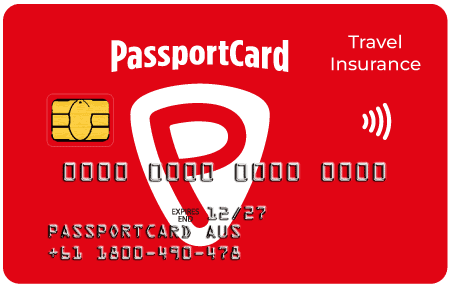

Travel Insurance With Diabetes Cover
Don’t let diabetes stop you from travelling
From monitoring your diet to staying on top of your insulin intake, living with diabetes can come with some challenges—but it doesn’t necessarily mean you should have to miss out on the pleasure of travelling.
With some careful self-management and the right travel insurance, you can enjoy relax and enjoy every minute of your trip with full confidence you’ll be covered if something happens.
Diabetes, automatically covered
At PassportCard, we believe that everyone should be able to experience the joys of travelling, even with a pre-existing medical condition like diabetes.
That’s why our travel insurance automatically covers many pre-existing medical conditions , including diabetes. Provided you:
- were first diagnosed more than 12 months ago and you have no known cardiovascular, hypertensive, vascular disease, related kidney, eye or neuropathy complications, and
- you meet all relevant conditions relating to travelling with pre-existing medical conditions as listed in the Combined Financial Services Guide and Product Disclosure Statement (PDS)
your condition will be automatically covered without the need to undergo a medical health assessment.
Unsure if your diabetes will be automatically covered?
If you have diabetes and don’t think you meet the criteria to be automatically covered, that doesn’t necessarily mean we can’t cover you.
Before you can obtain our travel insurance, you may need to complete a health assessment to help us better understand your condition and determine whether we can provide cover.
If you are unsure whether your diabetes will be automatically covered by our travel insurance, it’s best to contact our customer service team by calling 1300 123 413 for information tailored to your personal circumstances.
All benefits and covers are subject to the terms, conditions, limitations and exclusions listed in the Combined Financial Services Guide and Product Disclosure Statement (PDS) and on other policy documentation, including the schedule.



Instant payouts on approved claims with PassportCard
When you choose PassportCard, you’ll enjoy the extra peace of mind of knowing you’ll be able to cover most expenses there and then if something goes wrong.
When you purchase one of our travel insurance policies, we’ll ask you if you’d like a PassportCard to take with you on your trip. If something happens while you’re away (like your luggage is delayed, your cash is stolen or you experience a medical issue), our team can handle your claim quickly over the phone and transfer funds to your PassportCard on-the-spot**.
If approved, you’ll be able to withdraw cash to cover expenses that can arise from things like delayed luggage or stolen cash, or if it’s a medical issue, we can instantly add funds to your PassportCard so you can immediately pay for expenses when you need to.
You won’t need to fill out any paperwork and instant access to funds means you won’t be left out of pocket.
Find out more about how instant claims work or get a quote for your upcoming trip.
Diabetes travel insurance FAQs
Provided you meet the conditions relating to travelling with a pre-existing condition as listed in the PDS, you won’t need to disclose details of your condition to us. However, if you are at all unsure if your diabetes meets the criteria for automatic cover, it’s important that you contact us by calling 1300 123 413 for information tailored to your personal circumstances.
You may be able to make a claim if your diabetes medication is lost or stolen. If you find yourself in this situation while you are away, simply call us on +61 1800 490 478 and we can process your claim over the phone. If approved, we can instantly transfer funds to your PassportCard to allow you to pay for replacement medication there and then.
Gestational diabetes is considered a complication of pregnancy and generally isn’t covered by our travel insurance. Find out more about pregnancy travel insurance .
Yes. Provided your child is listed as a traveller on your policy and meets all conditions to be covered for travel with a pre-existing medical condition, they will be automatically covered under your travel insurance policy.
We only provide automatic cover for diabetes if you were diagnosed more than 12 months before the date of the policy was purchased. If you would still like to obtain diabetes cover with your travel insurance, please call us on 1300 123 413 and we can provide further information about whether we may be able to cover you.
Provided you meet the criteria as specified in the PDS to be automatically covered for each of your pre-existing conditions, you do not need to disclose details of your conditions. However, if you are at all unsure if you meet the criteria to be covered automatically, please call us on 1300 123 413 for information tailored to your personal circumstances.
Our travel insurance won’t provide coverage for any diabetes-related medical or hospital costs incurred in Australia (or in Australian waters) if they are covered by Medicare or Australian private health insurance. However, it is still a good idea to have travel insurance to provide cover for other events not related to your medical condition.
If your health circumstances have changed since you purchased your policy, it’s important that you let us know before your intended departure date by calling our customer service team on 1300 123 413. Knowingly travelling while unfit to do so may impact your cover.
Get cover for your next trip with PassportCard
Tips when travelling with diabetes
With some careful preparation, travelling with diabetes doesn’t have to be difficult. If you have a trip planned in the not-too-distant future, here are some helpful tips to ensure you can enjoy the experience to its fullest, without worrying about your diabetes:
- If you wear an electronic blood glucose monitoring device, contact the airline before booking your flights to check if they will allow you to use it in-flight
- Make any airlines you will be travelling with aware that you have diabetes and request diabetic-friendly meals
- Many airlines and airport security will need you to provide proof that you are diabetic to allow you to take your medication and equipment on board with you, so make sure you carry your National Diabetes Services Scheme (NDSS) card to use as evidence of your condition
- Obtain a letter from your doctor detailing your condition, the medications you take and the devices you use to monitor your insulin and blood glucose levels, as you will most likely need to present this when passing through customs
- Carry any medication you will need during transit in your hand luggage in its original packaging, ensuring the name included on the labels matches the name on your airline ticket and passport
- Ensure you pack sufficient medication for the entire duration of your trip, along with some extra supplies in case you experience delays. You should also take your prescriptions with you in case you need more medication if your original supplies are lost or stolen
- Speak to your doctor to find out how to adjust your medication schedule when travelling to a different time zone
- Take an insulated bag to ensure you can store insulin and glucose testing strips medication appropriately according to the climate at the destination/s you will be visiting
- Consider wearing a medical identification bracelet that states you are diabetic
- Let anyone else you are travelling with know that you have diabetes and let them know how to provide assistance if necessary
- Pack a spare meter if possible in case your primary meter is lost or damaged
- Always carry something like glucose tablets or jelly beans in case of hypoglycemia
- Keep in mind that sunbathing for long periods can lead to higher blood glucose levels, so make sure you are testing regularly so you can manage your condition appropriately
- Ensure you organise suitable travel insurance that will provide cover for your condition.













